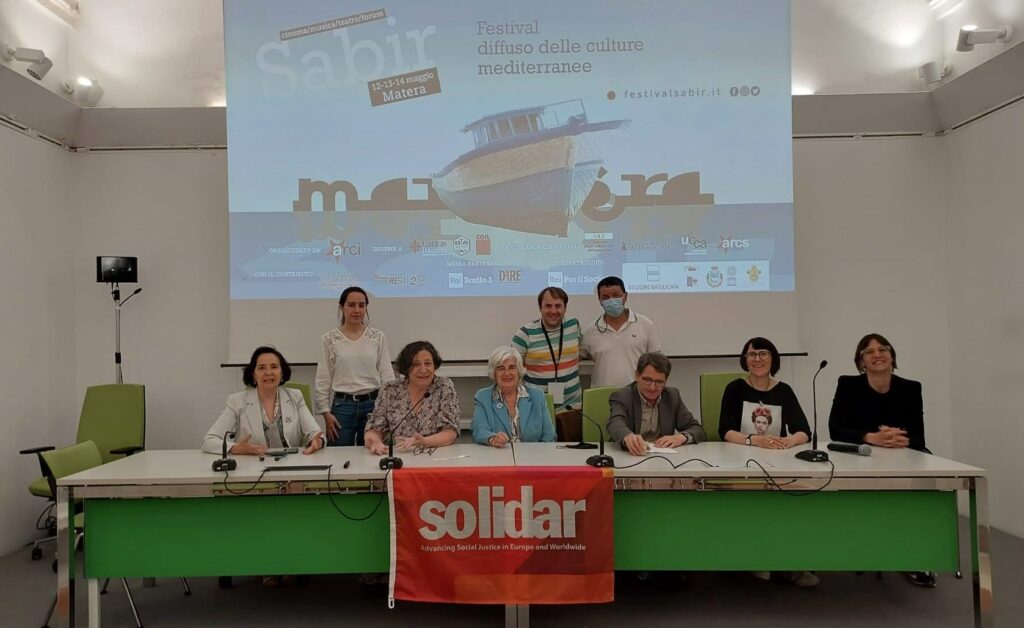SOLIDAR network at Sabir Festival 2022: changing the narrative for more inclusive migration policies

The 8th edition of Sabir Festival took place from 12th to 14th May 2022 in Matera, Italy. Sabir, the festival of Mediterranean cultures, is co-organised yearly by SOLIDAR members ARCI and CGIL, along with Italian organisations ACLI, Caritas Italiana, ASGI and Carta di Roma.
The Festival strives to offer moments of sociability, debate and in-depth analysis, with the idea to promote the Mediterranean area as a space of rights, social justice, and transnational exchange. The presence civil society representatives from the two shores of the Mediterranean and of international networks enriches the discussion, with the view that proposals emerge for necessary policy and narrative shifts on mobility, asylum and migration management.
The Festival features various types of events, from conferences and seminars to training sessions and cultural/artistic activities (musical and theatrical performances and book presentations), on a broad range of migration-related topics. An important focus this year was the European response to the war in Ukraine and the ensuing flows of people fleeing, with clear double standards. Other topics touched on were right of movement in the EU or the increasing criminalization of migration.
SOLIDAR Secretariat was happy to be present on site with a delegation of members from all over Europe: Initiative for Development Cooperation – IDC (Serbia), Movimiento por la Paz – MPDL (Spain), Centre for Peace Studies – CMS (Croatia), Willi Eichler Akademie (Germany), Rede Sem Fronteiras – Diasporas Sem Fronteiras (Portugal). The SOLIDAR delegation took the floor several times, in particular in the following panels:
Denied protection and the new European Pact on Migration and Asylum
The EU external borders have become places where legal guarantees are suspended, where people are turned away or detained while awaiting repatriation. The panel took a look at the practices in place in some European countries, and the impact that the proposals under the EU Pact on Migration and Asylum has and would have on the rights of asylum seekers and migrants in accessing asylum and alternative forms of protection.
Susanne Drake, Willi Eichler Akademie, put in perspective our perceptions of migration, highlighting the fact we do not usually call people from the Global North ‘’migrants’’ when they move to the Global South; the term and its negative connotation are for people from the Global South. This common double-standard is rooted in European imperialism. She proposes to speak about human mobility instead, also with the view to emphasize that human beings have moved in search of a better life, since the dawn of mankind.
Manuel de la Rocha, from MPDL, reminded that alternative forms to protection exist besides asylum based on the Geneva Convention, and are underused. EU Member States need to better take into account the specific vulnerabilities of unaccompanied minors, women victims of violence or trafficking, people with an illness or a disability, etc. Manuel de la Rocha also explained that EU countries presenting themselves as victims of “instrumentalisation of migrants” (Poland from Belarus, Spain from Morocco…) is dangerous, as it fosters the narrative that migrants influxes are a threat to national security.
Sara Kekuš from Centre for Peace Studies talked about the violent pushbacks at the Croatian external borders, drawing on findings from CMS’s latest pushbacks report. Croatian border monitoring mechanism lacks transparency, independence and efficiency, and as such represents a very dangerous model for other monitoring mechanisms to be established in the EU. CMS and other CSOs in Croatia call for Croatia and the EU to put an end to pushbacks and systemic violence at the Croatian border, investigate the violations and sanction the responsible parties, and establish a truly independent and transparent border monitoring mechanism.
Call for intersectional migration policies
Powerful experiences and messages were also shared in the panel on Women’s rights and fights in contexts of crises. Francisca Sauquillo, President of MPDL and SOLIDAR, talked about the ways gender conditions greatly the migration decision, journey, and outcomes. Gender is a crucial variable in the design of migration policies – yet, EU migration policies completely miss this focus on the gender dimension. Going beyond gender, Francisca Sauquillo called for an intersectional analysis, as migrant women & men experience multiple discriminations & forms of violence that are aggravated by gender identity, sexual orientation, migration status, age & class.
Protection and rights for migrant workers
Last but not least, Concha Gutierrez, MPDL, intervened in a panel on labour rights of migrant workers in the Mediterranean area. She reminded the essential role of migrant workers in European societies during the pandemic, in sectors such as food and agriculture, supply chains, care and service provision where migrant workers have a strong presence. She also praised the Spanish government’s decision to ratify ILO convention C189 on Domestic Workers, something civil society organisations including MPDL, and Trade Unions had long been calling for and working for.
You can read the main takeaways from the discussions on ARCI’s website (in Italian).
The Festival was the occasion for the SOLIDAR delegation to explore Matera and learn about its history, meet Italian and European stakeholders on migration and inclusion, and hold a Task Force on Migration and Inclusion meeting. During this meeting SOLIDAR members exchanged on specific challenges regarding migrants, asylum seekers or beneficiaries of temporary protection in their respective countries, identifying ways to reform EU and Member States’ approaches on migration, asylum and inclusion for more rights-based, non-discriminatory policies.


